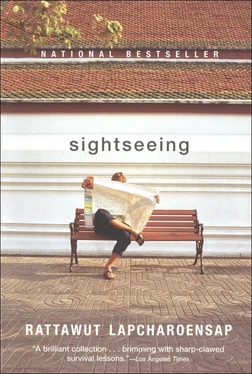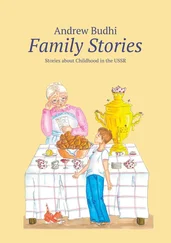We made our way back to the smoldering shanty. To my surprise, Dong was there when we arrived, chatting with Priscilla’s mother. We didn’t acknowledge one another. The Cambodians were gathering their belongings, getting ready to leave. I went with Priscilla to her mother, listened to them talk for a while, tried to ignore Dong standing beside me. It suddenly made me nauseated being around the Cambodians.
Priscilla was asking for something in a pleading voice. Her mother nodded, looked at her sternly, looked over at Dong and me every so often. They were arguing about something. But then, after her mother nodded once more, Priscilla skipped excitedly to their knapsack and dug out the teakwood box.
“This is for you,” she said, putting the tooth in one of Dong’s hands. Dong looked at me for the first time. “I can’t take this, girlie,” he said, shaking his head, extending his open palm back to her.
“It’s for you and your mama,” Priscilla said, closing his fingers around the tooth. “Take it or I’ll beat you again.” Dong shrugged. “Okay,” he said, shoving the tooth into a pocket. “Thanks a lot, girlie.”
She looked at me. I was next. I wanted to tell her no. I wanted to stop her. But Priscilla was already working away at that incisor, wobbling it back and forth with a thumb and a forefinger, her face contorted in pain and concentration. All the Cambodians stopped, looked over at Priscilla and me. She seemed to work at that incisor for an unbearably long time. I could hardly look at her do it. And then with a strong, vigorous gesture she got the tooth free at last, and there was a small gap now where there should’ve been gold, a smidgen of light red blood on her gums.
“And this is for you,” she said, wiping the tooth clean on her pants, handing me the thing. I took it, put it in my back pocket. I thanked her. And then she went over and helped maneuver the large knapsack onto her mother’s back.
We never heard from Priscilla the Cambodian again. Those, too, were the last days Dong and I spent together. Soon after, Dong’s parents sold their duplex back to the development company for half the original price. My parents eventually did the same for even less money.
That day, however, Dong and I stood by their ruined shantytown and watched them walk away, their figures getting smaller and smaller by the minute. But then, wordlessly, I decided I couldn’t watch them leave. I walked over to Dong’s bike and picked it off the ground.
“Hey,” he said. “Give me my bike, you asshole.”
“You fat fuck,” I said, scrambling onto the seat. “Come get it yourself.”
I started pumping away at the pedals again, standing upright, the wind blowing quickly through my hair, Dong’s exasperated voice trailing off behind me. I don’t know how long I biked that morning. In my mind, I’d decided to bike to the ends of the earth. The development flew by. I biked past its limits, out onto Pattanakan Road, past the Thicknecks’ pristine development. I crossed through the fresh market. The streets and the people became stranger by the minute. I biked through thick traffic, smoke and exhaust whipping around me, cars honking every so often as I maneuvered haphazardly between them. I climbed over the bridge spanning some wide black canal. I went farther from my house that morning than I’d ever been on my own. I kept biking until the sun rose high in the sky and my body quivered from exhaustion and my thighs burned as they’d never burned before.
I stopped at an intersection; men and women in business suits looked at me sternly as they walked by. I didn’t know where the hell I was. I didn’t know how long I’d been biking. I needed to get to a bathroom. I needed to piss; I needed to vomit as well. I left Dong’s bike by a telephone booth and went into a noodle shop. The owner eyed me curiously over steaming vats of broth. He asked me what I wanted. I could tell that he thought I was some street urchin. I didn’t say anything. I just marched to the back of the shop and slipped into the bathroom before the owner could stop me. In the bathroom, as I was urinating, I remembered the tooth Priscilla gave me. I threw that keepsake into the toilet bowl. I flushed. I decided I couldn’t keep a thing like that.
When I emerged from the bathroom, the owner was waiting for me, frowning severely. “What the hell are you doing, kid?” he asked me.
“I was taking a piss,” I said. “What did you think I was doing?”
He reached out and tried to grab me by the collar. I slipped from his grasp just in time. I tried to punch him in the stomach. But he’d reached out to grab my wrists — one, then the other. His hands were strong. He gripped me hard and pulled me toward him. All the strength left my body, and my eyes suddenly felt hot with tears. I was crying, though I hadn’t realized it until then.
The owner of the noodle shop knelt down to look me in the eyes.
“I’m not one to thrash another man’s child,” he whispered through gritted teeth. I felt my hands getting numb from his grip. I tried to writhe away but the more I struggled, the harder his hands held me in place, his thick fingernails digging into my skin.
“So this is what we’re gonna do,” he said. “We’re gonna pretend that you didn’t just try to punch me. I’m gonna let you go and I’m gonna count to three. By the time I get to three, you’re gonna be gone. You’re gonna go back to wherever the hell you just came from. You understand me, boy?”
I started crying in earnest then, the tears streaming freely down my face, mucus salty on my lips.
“Let me go,” I whimpered. “Please.”
“I’m not running a goddamn orphanage here, kid,” he continued, still gripping me. “I’m not running a public rest room, either. I’m running a business, you understand me?”
He stared at me for a while, his face contorted with exasperation.
“You understand me?” he asked again.
“Yes, sir,” I stammered. “I understand you, sir.”
“Good,” he said, letting go of my wrists. “One. Two. Three.”
DON’T LET ME DIE IN THIS PLACE
My son Jack says I’m being difficult. It’s dinnertime. It’s hot as hell. The mongrel children are kicking each other under the table, yapping and giggling senselessly. The wife’s coming at me with spoonfuls of cold, clumpy porridge. Each time the spoon hovers close to my face my foreign daughter-in-law opens her mouth like she’s instructing me by example. I hate it when she does this. It’s demeaning. I know how to eat, thank you very much. And while I’ve learned to accept with dignity the fact that I can’t really feed myself anymore — and while, hell, I’ve even learned to live with wearing a bib during meals — every time my son’s wife opens her mouth like that it’s almost enough to set my dead right arm to shaking.
“Jack, please tell her to stop,” I say, the spoon so close I could lick it, the wife with her lips parted stupidly again. “Tell her I hate it when she opens her mouth like that.” But my son just gapes at me, sighs, and says, “Don’t be difficult, Father,” like I’m some child misbehaving in a department store.
The wife looks at me, looks at Jack, shoves the spoon back into the porridge bowl. She gets up from the table. The mongrels quiet down for the first time all evening. “Enough,” the wife says in English to my son, throwing up her hands. “I no do this no more, okay? He eat by himself now, Jack.” Jack sighs again, calls after the wife by her name. He says, “Tida—,” but she’s already halfway out of the kitchen, muttering to herself in Thai like some crazy.
Jack blinks at me, frowning. “Nice,” he says, getting up to follow her. “Mission accomplished, Father.”
Читать дальше











